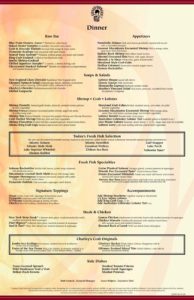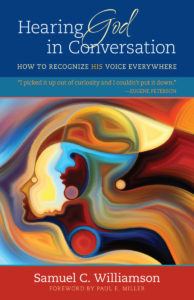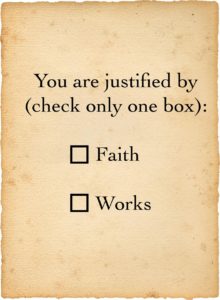A few years ago a client came into town for a series of meetings. He asked for a restaurant recommendation, and I suggested my favorite restaurant, The Gandy Dancer. The next day he came to my office  and raved about the restaurant. He was going to recommend it to every one of his colleagues.
and raved about the restaurant. He was going to recommend it to every one of his colleagues.
I asked him what he’d ordered. “Nothing,” he said, he’d been too busy. But he had “stopped by and studied the menu, and everything looked incredible.”
I thought he was nuts.
But I’m beginning to think that most of us believers are equally “nuts.” We read the menu and miss the meal. We nourish our Christian lives by feasting on a cardboard menu of untasted truths.
The cardboard menu is a link to a spiritually nourishing banquet, but too often we simply chew on the cardboard. Is it any wonder our lives look like cardboard-cutouts?
Frankly, cardboard is neither life-giving nor nourishing. Even with a dash of salt.
The Christian life is more than the menu
Let’s examine the menu item of Justification by Faith. Christians believe that they are justified by faith and not by works. I do too. But too much of our teaching merely expounds the menu concept of Justification. It doesn’t teach us how to feast on—how how to live a life of—Justification by Faith.
We are reading the menu and missing the meal.
The Test
It’s as though we think that entry into heaven is a single-question multiple-choice test. We arrive at the pearly gates and St. Peter hands us the Entry-Into-Heaven-Exam,
The Incarnation of God, the earthly ministry of Jesus, the suffering and death of the Messiah, and the resurrection of the Son of Man; they all boil down to this moment. Which box will we check?
The hosts of heaven wait in anticipation. The disciples stare; the martyrs watch; the angels, the seraphim and cherubim all wait with hushed eagerness. It all comes down to this: which box will we check?
Is this the essential ingredient of the Christian feast? Does it all boil down to an impersonal, abstract, dry, lifeless check-box on a test?
Nope!
Justification by Faith is an invitation to a literal feast that feeds us now. Christ’s abundant life promises more than an extension of a cardboard-cutout life in the hereafter.
Are we content with the correct, cerebral concept; or are we operating in the personal lived-in reality of the truth. Are we chewing on the menu or feasting on the meal?
There are two ways to know the sweetness of honey. We can study it under a magnifying glass or we can taste it. God says there are two ways to know Justification by Faith (or any truth). We can study it on the menu. Or we can taste it.
We can read the right menu but feast elsewhere
It is possible to hold the correct abstract concept—Justification by Faith—and not actually be Justified by Faith. In fact, this happens all the time. I suspect even Satan could check the right box.
Justification is what we turn to for our own self-value. When life seems sour, where do we turn for sweetness? Where do we turn for a personal sense of significance?
We may claim Justification by Faith in our heads and yet find our sweetness elsewhere:
- We may primarily feel good about ourselves when our children behave
- We may receive our self-esteem from success, promotions, or money
- Perhaps we only feel fulfilled when in a romantic relationship
- Perhaps we get our personal applause from successful preaching or ministry
Ironically, we can even get our sense of self-significance due to our correct adherence to an abstract doctrine, even if we don’t live it. In fact, when we justify ourselves by checking Justification by “Faith,” it is a type of justification by works; the “work” is our theological correctness.
Acknowledging the correct answer—Justification by Faith—is not the same thing as the state of being justified by Faith. Reading the menu is not the same as eating the meal.
What can we do?
We need to find and then starve our self-justifying habits. Our self-significance activity (our true self-justification) dulls our appetites for the real meal.
If we eat enough cardboard, even the best meals look unappetizing.
God himself, in himself, is the only satisfaction for our deep inner hunger for significance. Other self-justification—romance, career, family, even self-congratulations for correct doctrine—are poor substitutes for the justification that comes from God.
Why else would God invite us to “taste and see how good our God can be” (Psalm34:8)? Joyful are all who take their meal with him.
We’re all hungry. What are we going to have for dinner?
Sam
For more information about connecting with God, learning to experience the Almighty, read my latest book, Hearing God in Conversation. It is written with the idea of a personal, engagement, connection with God.
[vimeo id=”189561250″]
Hearing God is supposed to be normal. God himself longs for us to grow in intimacy with him; and the greatest way to know God is to learn to hear his voice. [button href=”https://www.amazon.com/Hearing-God-Conversation-Recognize-Everywhere/dp/0825444241/ref=cm_cr_arp_d_product_top?ie=UTF8″ primary=”true” centered=”false” newwindow=”true”]Buy Now[/button]



Great post, Sam. It really gives me something to ‘chew’ on… We are so fickle though. Even when we do experience and ‘taste’ this abundance, we all too often become the ‘prodigal’. We take that strength, that nurishment and squander it on things of this world.
Thanks for bringing me back to a place of thankfulness! Great job listening!
Tom J
Hi Tom,
Thanks for that good image; we can sometimes taste the real meal and then go looking elsewhere.
Good point.
Wow, this really made me think. I know what you’re talking about and I do it all the time. I think I know the difference between cardboard and a feast, but somehow I so often end up back at the cardboard. This gives me lots to think about.
Great post. I needed to hear this and so does my congregation.
I think you are playing with some terms here. The terms “Justified by Faith,” “Justification by Faith,” or Justification by works” are usually used to denote the source of our freedom from sin and the source of our holiness, not the source of self value. I was initially confused because every time I read those terms I read them with that definition (actually I still can’t read them without thinking of this). That being said I do understand what you are getting at. It reminds me of the elder son in the story of the prodigal son. The elder son complains to the Father about being His workman and never being recognized. He finds self value and self worth primarily through what he does well and his accomplishments rather than in being the son of the Father. Part of the Father’s invitation to the elder son is to claim the self value being offered him as a son.
Hi Christopher,
I agree in general with your distinction, but I only agree in general. In reality, I believe the two are so closely linked as to be inseparable. Theoretically they are distinct; in practice … not so much.
Yes, justification is the source of our freedom from sin. But justification was also the source of our original sin. Satan says, “if you eat this, you will be like God.” Satan was appealing to a type of self-justification.
Likewise, if we say we are “justified by faith” but our primary source of self-respect is our “good family” or job, or ministry (etc.) … the source of our self-identity is a signpost of our justification. Note: it is not our justification, but it is a sign.
Having said all that, I don’t mean that a perfect life is the sign of being justified by faith. Theologians call it, “The already but not yet” of life. We can be already justified but not living it yet.
On the other hand, if all we teach is the abstract adherence without getting our identity from God … it can also be a sign that our self-justification is still our only justification so far.
Thank you Christopher, you raised a challenging and interesting issue.
Thanks!!
Interesting distinction, Christopher. Your definition, though, seems more about sanctification than justification to me. I think of justification as the means of our right standing with God, not the means of our righteousness or holiness. Actually, I haven’t studied theology sufficiently to really know what I’m talking about, but maybe that’s to the point. Whatever the definition, drawing a line between the mechanism and the effect is too fine a distinction for the average Christian to make while navigating the Christian life. If an ordinary believer who is in fact justified before God by faith nonetheless lives with a subtle underlying anxiety that he maybe can’t put his finger on but which is really about the ways he fears he’ll fall short and mess everything up—well, the implications of his justification are, in effect, escaping him.
I am going to apologize in advance for the long-windedness of this post, but I wanted to make clear what it is I was trying to say.
What I was trying to communicate was that I was, and to some degree still am, confused as to what is being communicated here. I do understand and appreciate that there are many components of the christian faith which many Christians cannot distinguish between. But that does not mean it is not important to distinguish between them; most especially just because we think the distinction is trivial. I love the title of this blog and the theme behind it: Beliefs of the Heart. I am of the opinion that there is often a huge gap between what people say they believe and what they actually believe. Here the distinction lies in the difference between intellectual consent and the way in which one lives. I can say I believe that the Christian God exists, and then live my life as though He doesn’t. So I both do and don’t believe in God; but notice, while the word is the same the meaning is different.
My own confusion with this post was that it appears as though the word justify. and its derivatives. are being used with 3-4 different meanings, and from what I can tell being used interchangeably, as though each meaning was identical with the other. I will take a quote from your response, Sam, to show you what I mean:
“Yes, justification is the source of our freedom from sin. But justification was also the source of our original sin.”
The second usage of the word justification means “an excuse/reason for which an action should be committed.” (Adam and Eve justified eating the fruit on account of its desirable character and because of its power to make them like God.) While the first usage of the word justification is “that which makes us just/right/holy/free from guilt of sin.” (Faith in Jesus Christ makes us just before God.) There is no sense in which we are offering a reason for a course of action here. These ideas are distinct.
So I guess there are two points I want to make here: First when you use different ideas interchangeably as if they were the same, you will confuse someone like me. I will have a difficult time following what you are saying. Secondly, but more importantly, if you use different ideas interchangeably as if they were the same, you run a STRONG risk of saying something completely false, and leading people astray. I have doubts that this is actually happening with this post, but it is something to keep in mind.
Hi Christopher,
Thanks for putting so much thought into this. It was not my primary intent to define Justification by Faith. Many people can abstractly define it without living it. My intention was to ask, “How how to live a life of Justification by Faith?”
If we are justified by faith, it has to mean more than mere arid, abstract assent to a doctrine. We have to step into it. It is a volitional act of the heart, to rest our lives on it, to base our lives on it.
My intention is to say that we can have a set of head-beliefs that are not heart-beliefs. We can see our heart-beliefs by the way we live–or at least we can see the degree to which our heart rests in those beliefs.
When we self-justify, we are resting our hearts on something else: maybe our good “works,” or our grades, or our looks, or our careers, or even our doctrine.
When our activity is based on self-justification–to that degree we are not living a life of Justification by Faith.
In this case, I think we need to make sure we DON’T make a distinction between the abstract doctrine of Justification by Faith and actually living a life of Justification by Faith.
Thanks for your comments and continued thinking.
Sam
Hi Sam
great post have been enjoying your blog back in North Dakota
Hi Bill,
How is the real estate market doing these days?
Sometimes I think we can have too much teaching in our churches. We run from sermon to class to lecture, and we stay so busy reading “menus” that other people put together that we find very little time for the eating. But something special happens when everyone in the Bible study actually studies the Bible passage all week, or when everyone in the prayer meeting actually prays. Justification is a great example, but I bet we could make an endless list of things that are Christian concepts instead of practices.
Rachelle,
You hit the nail on the head. “Justification by Faith” was just one item on the menu of truths we need to digest. What about the fact that God loves us? We can read it, define it, dissect it, and even lecture on it. But God wants us to taste it. The same is true for our sinfulness, our forgiveness, the view God has of us, and much more.
There is such a thing as understanding of the head and understanding of the heart. God is looking for us to understand this in our hearts.
Excellent point. I wish I had made it. But now you have, so all is well with the world.
The phrase that leapt out at me: “…find and then starve our self-justifying habits.” I usually think in terms of “feeding” the right stuff, but this obvious corollary had been escaping me. Some more specific examples of those self-justifying habits would be nice. It’s hard to put your finger on them in yourself, I think. And of course you’re right—you have to notice them before you can decide to stop nourishing them.
Sam,
Although cardboard is not nourishing, it is filling. If we picture God as poised to give us that final exam at the pearly gates, if we think the entrance into life depends on having the correct answer(s), and if we expend the present on cramming for the exam by stuffing ourselves full of “cardboard,” we will feel satiated while we are starving ourselves of real nourishment.
The psalmist calls us to taste of God’s goodness. Jesus calls us to eat and drink of Him. If we “feast” on cardboard, we will look and smell like cardboard rather than exuding the life-giving aroma (2 Corinthians 2:14) of Jesus alive within us.
Sam,
Really enjoyed your words. My heart tells me me that we, or I, are justified by faith…but my mind gets in the way…tells me that I have to try harder, do better…